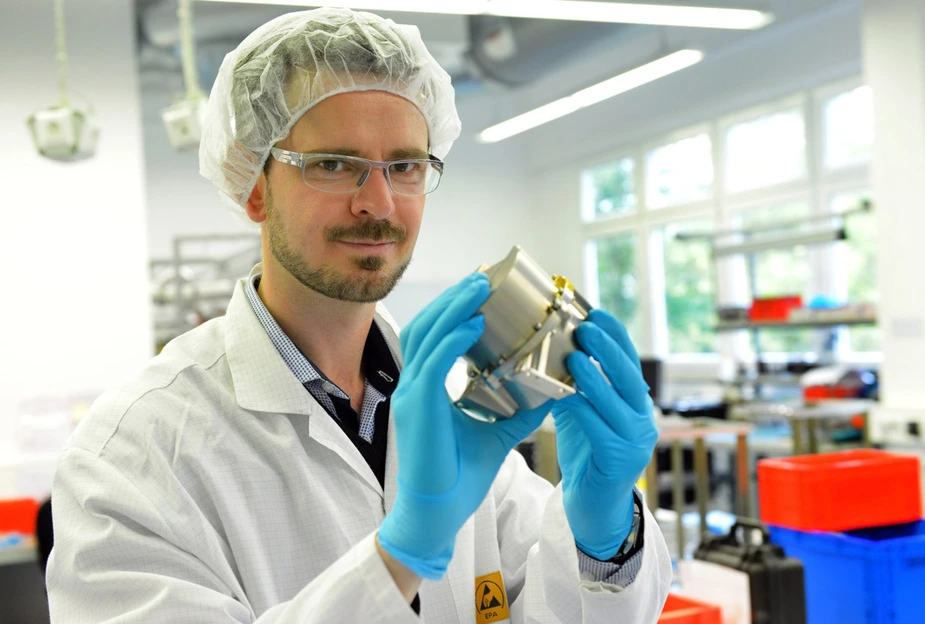Looking ahead
It’s time to ask entrepreneurs from Adlershof about their aspirations
The 25th anniversary of the Technology Park Adlershof – time to lean back and reminisce? That is not what the people of the science and technology site are about. We will continue to write our success story.
David Feustel and WISTA-MANAGEMENT GMBH (Wista) have one thing in common: they have both existed for 25 years. And one other thing: both are very successfully working for Adlershof. Wista has been on a mission to develop the campus just a tad longer. At 25, Feustel is still at university, but has almost completed his master’s degree in chemistry at the Humboldt-Universität zu Berlin and has co-founded solaga, a biotech company at his young age. With a procedure that involves cyanobacteria from algae creating biogas with CO2 and sun light, the start-up aims at creating an ecological alternative to heating systems using fossil energy sources. This technology is self-sustaining, more efficient than photovoltaic systems according to current estimations, and the fuel it produces, methane, is easier to store.
The future trend in the energy industry is interconnected and carbon-neutral technology. The founder explains: “Adlershof is advancing this development, especially with regard to hardware.” It is no coincidence that the two 25-year-olds crossed paths in the Technology Park Adlershof: “Problems are taken in hand here and tackled quickly. The site has developed rapidly – and will continue to,” Feustel expects. He believes that Adlershof is a great location for founders as well as for large companies.
If you ask Roland Sillmann about the past, he dismissively waves his hand: “We have reached a very high level of development,” says the manager at Wista, who has been in charge of the operating company since the beginning of this year. But for him this is merely a step on the way: “We should keep striving for more.”
”We are a publicly-owned company. Out task is to generate economic growth in Berlin.” This won’t change in the future. Future, to him, is a sober look at the numbers: “If we base our assumptions on the growth of the past years, this site will be fully developed in five years.” At that point, about 20,000 people will be working here in approximately 1,200 companies “provided the economy doesn’t thwart our plans.”
The mission is “to put Berlin among the five top locations for research and development in Europe.” Wista ensures optimal conditions for founding, attracting, and developing high-technology companies. Adlershof will stay a place of continuous growth without frantic “ups and downs”. The companies in Adlershof “cater to industrial customers for the most part. They produce highly specialized products and plan in the long term.”
Future – this also means benefiting from the past. Wista has an extraordinary wealth of knowledge and experience begging to be passed on. “Adlershof serves as a model for others. We are active in many places all over Berlin.”
Sillmann has a realistic view of the future. Adlershof will contribute to developing the “smart cities” of the future. “These intelligent cities, however, will not be created by a master plan, but will be the result of a multitude of innovations, which no one can predict today.” This is a great chance for Adlershof. We want to achieve that the products required for “smart cities” all over the world come from Adlershof. “For this reason, we will use our infrastructure to initiate pilot projects, for example, in the energy industry or e-mobility.”
“Adlershof is already great, but there is still untapped potential,” says Michael Scheiding, manager of Astrofein GmbH, who develop and produce high-precision technology for astronautics. The university and the research institutes will continue to produce new companies, some of which will prevail. The research departments of large companies will also benefit from this innovative climate, which will lead to a heterogeneous mix of various disciplines and company sizes in Adlershof. “I hope that our companies will fill the campus and technology park with the spirit of cooperation. It’s up to every one of them to approach one another,” Scheiding points out. Science should be aware of the problems of companies and, at the same time, companies should realise the productive potential of science. “The same goes for Adlershof as a hub for astronautics,” says Scheiding. Small satellites, components, experiments, instruments, and technologies from Adlershof are being sent all over the world and, lastly, to space. Scheiding: “However, we are not on a level playing field with other astronautics sites. To achieve this, policy-makers would have to increasingly recognize the potential of astronautics from Adlershof.”
Does he believe that space tourism will be established in 25 years and Astrofrein an important supplier? “I am sure of it”, says Scheiding. This will have consequences for the company: “At the moment, we are still not in the top three internationally.” But the Astrofein boss is optimistic: “We are working hard on advancing our products and to send more and more of Adlershof to space. If we stay true to our core values of keeping in mind markets and customers, we will continue to play a relevant part in Adlershof.”
Feustel also sees himself as an active entrepreneur in 25 years. “I want to work independently, create things that are relevant, and good for the environment,” he says about his own future.
By Chris Löwer/Peter Strunk for Adlershof Journal
